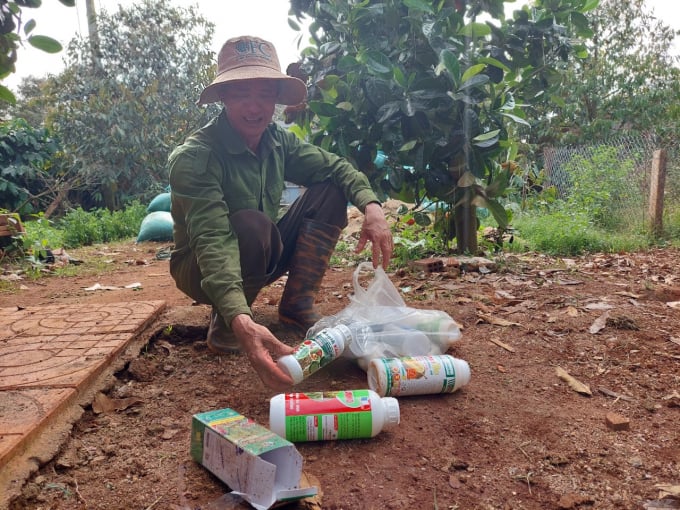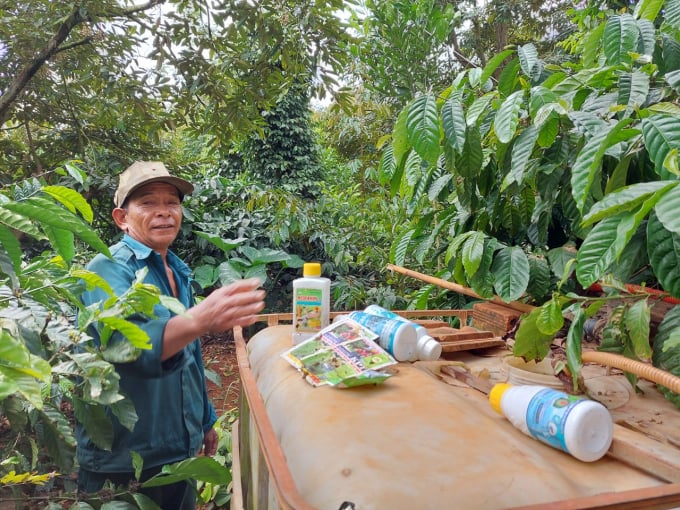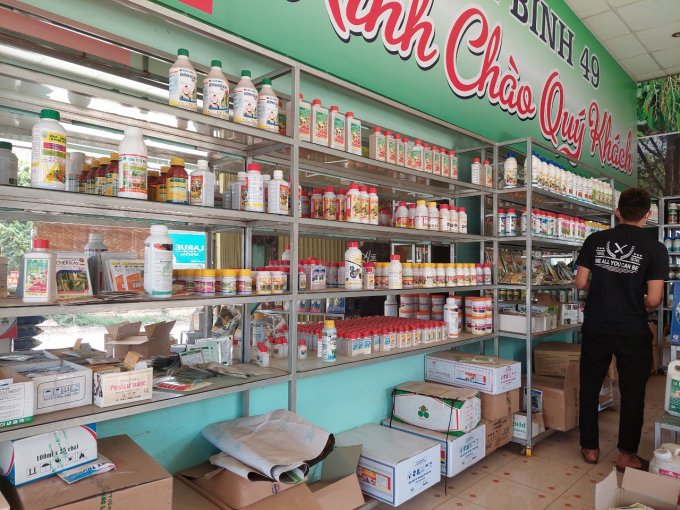June 19, 2025 | 04:10 GMT +7
June 19, 2025 | 04:10 GMT +7
Hotline: 0913.378.918
June 19, 2025 | 04:10 GMT +7
Hotline: 0913.378.918

The chaos in the agro-input business threw Central Highlands growers into great confusion. Photo: Hoang Anh.
Wandering in the Central Highlands and asking around, we were struck by a reality that growers found themselves strangled in the matrix of fertilizers and pesticides, not knowing what products were real or fake.
Agents trading in fertilizers and pesticides sprang up like mushrooms in key agricultural production areas in the Central Highlands. This place had become a lucrative market for production and business enterprises and their whole bag of tricks. An owner of a business specializing in trading fertilizers and pesticides in Buon Ma Thuot revealed to us that the agro-input supply market in the Central Highlands region was divided into 3 types: large foreign enterprises coming to invest, relatively reputable large enterprises within the country, and "ghost" enterprises in the form of intermediates.
And in recent years the Central Highlands’ agro-input market has been very chaotic, largely because of this third type.
Most of these enterprises often import raw materials across borders such as China, Laos, and Cambodia. They even smuggle products containing active ingredients banned by the Ministry of Agriculture and Rural Development and then counterfeit and make imitation products of reputable brands in the market. Using the setup of exclusivity, small owners distribute products to agents at extremely low prices, discount very high profits or sell them through social networks.
Taking full advantage of the Covid-19 pandemic situation, these "small bosses" immediately adapt and switch to doing business via e-commerce platforms and social networks. Just joining the fertilizer and pesticide business groups on Facebook, one can easily see images of pesticide products containing banned active ingredients such as Helosate, King of Herbicide (“Vua diệt cỏ” in Vietnamese), Lyphoxim, Niphosate, Glyphosan, Glyphoxym-Thai 480SL, Lagoote.

Central Highlands growers are drowning in the matrix of the agro-input market. Photo: Hoang Anh.
And that is just the tip of the iceberg. But the local management authorities still “sing the same chorus”: constantly uttering words about an overall picture of hardship, crying over the sophisticated schemes of the "small bosses", while in fact there are other "delicate" reasons.
“A lot of officers working in management authorities are also owners of agro-input trading agents. Of course, it is difficult to confirm whether there are ‘negativities’ or group interests in business activities, but agent owners usually take advantage of growers’ agitated state of mind and difficult situation to sell the products that bring them the most profit. They don’t even care if the products are harmful and dangerous to growers and their land,” said Mr. Tran Van Luan, a farmer in Cu Elang commune, Ea Kar district, Dak Lak.
Sharing with the journalists of Vietnam Agriculture News the story of the still-chaotic agro-input market, Mr. Le Hoang Vinh, Head of Dak Nong Station of Agriculture and Rural Development, said, “It is true that the market for fertilizers and pesticides has become too large to manage. The Sub-Department of Crop Production and Plant Protection often assigns teams of experts for inspection year at the beginning of the rainy season down to the district level. But it seems that they have information about the schedules and respond accordingly, so it is difficult to track them down. Farmers are having a hard time just to make a safe choice considering the current situation."
The loopholes in management combined with the sophisticated trickery of production and business enterprises are turning the agro-input market into a true matrix. Even the direct managers in this field also see many inadequacies.
Let's take pesticides as an example. The same active ingredient is registered, but too many businesses pack it in different products to release into the market. They used similar tactics to attack growers: one agent said that this product was “super” good at eliminating aphids, but the other may say it was “super” good at eliminating planthoppers or granting “super” large tubers, “super” fruits. But growers in fact did not know that all these products only had the same use.

Business agents use all sorts of tricks to make the agro-input market even more chaotic. Photo: Minh Quy.
“They all claim to have registered ‘exclusive trademark’, each with a different name. Some agents can give out the right advice, but there are also others who do not have any knowledge and expertise but still release these ‘exclusive’ goods and sell to growers while harboring their own separate intention - risking it all for profits,” said Mr. Truong Van Cao, Head of Krong Pak Station of Crop Production and Plant Protection.
Acknowledging the problem of chemical fertilizer and pesticide abuse in the area, which is partly caused by business trickery, Mr. Truong Van Cao further analyzed, “To improve this situation, people have to change, starting from themselves. It will surely be a long process as they cannot shift to new growing habits right away, not to mention the higher the economic value a crop possesses, the more growers are leaned toward the habit of indiscriminate pesticide usage in search of short-term (or say, short-sight) profit.”
Translated by Samuel Pham
/2025/06/17/3942-2-143243_548.jpg)
(VAN) Recently, in Sweden, the Secretary of the Binh Dinh Provincial Party Committee presented the Investment Registration Certificate for the 'Polyester Fabric Recycling Complex' project to SYRE Impact-AB Company.
/2025/06/12/3721-2-202745_83.jpg)
(VAN) TH made an impression at Seoul Food 2025 with its line of natural beverages, paving the way for Vietnamese food products to enter the South Korean market.

(VAN) Soc Trang's success in rice exports stems from a strategy of developing fragrant and specialty rice cultivation areas and standardizing production toward low-emission practices.
/2025/06/11/1311-5-120811_839.jpg)
(VAN) The pig farming industry is facing the challenge of comprehensive restructuring to meet requirements for quality, safety, traceability, and market expansion both domestically and for export.

(VAN) Vietnam considers participating in ALGROALBA in order to expand agricultural production, coordinate the assessment and effective exploitation potential land.
/2025/06/05/5314-1-184727_407.jpg)
(VAN) From seemingly worthless fish scales and skin, enzymes and lactic ferments can transform by-products into peptides, opening a sustainable, effective business direction and elevating Vietnamese seafood.

(VAN) TTC AgriS and IFC signed a strategic partnership to develop a sustainable agricultural value chain, aiming to achieve the Net Zero target by 2035.